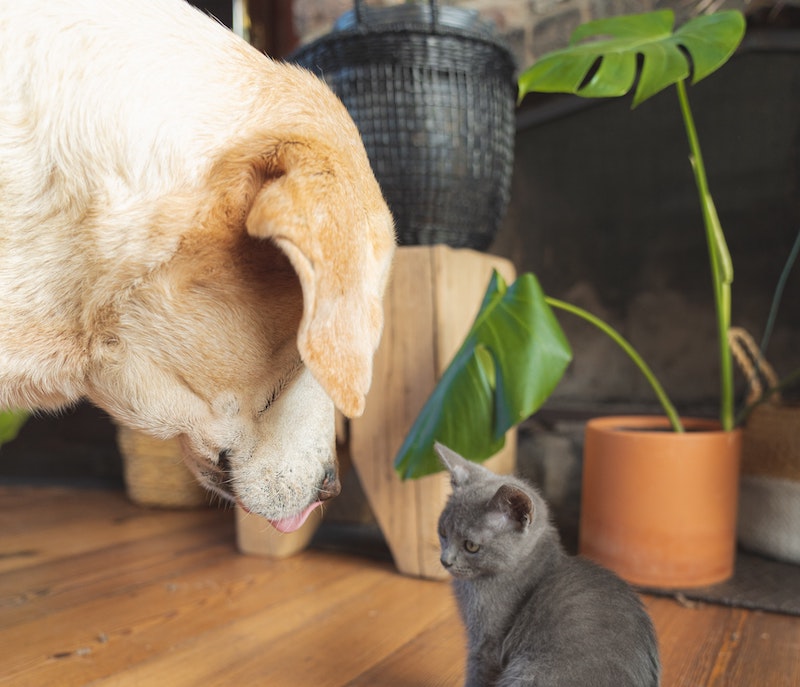Monstera is mildly toxic to humans and is toxic to cats and dogs but is not considered lethal.
All parts of the plant are harmful to ingest except the fully ripe fruit, which rarely develops on indoor Monstera. The toxicity comes from insoluble oxalate crystals in the juices inside the plant. Symptoms of Monstera poisoning include oral irritation, pain and swelling of mouth, tongue or lips, drooling, vomiting, and difficulty swallowing. Contact your doctor or veterinarian if you, your children, or pets are experiencing these symptoms.

Is Monstera Poisonous to Children?
Monstera is toxic to children of all ages and babies. It is safe for children to come into skin contact with Monstera soil, foliage, and stems. It is not safe for children to ingest any part of the plant. Do not let your children ingest any amount of the plant. It is also dangerous for children to come in contact with any juices from torn foliage and stems of Monstera. It is best to keep your Monstera plant out of reach of your children.
Is Monstera Poisonous to Dogs?
Monstera is toxic for dogs of all ages but usually not deadly, even when ingested. It is safe for dogs to come in contact with fully intact foliage and stems of Monstera. The juice inside Monstera stems and foliage may irritate your dog’s skin. It is also harmful for dogs to ingest any part of the plant due to the presence of oxalate crystals. Signs of Monstera toxicity include drooling, oral irritation, vomiting, and difficulty swallowing. Contact your veterinarian if your dog is showing these symptoms. Try to keep your Monstera plant out of reach and monitor your pet when it is near the plant.

Is Monstera Poisonous to Cats?
Monstera is poisonous for cats of all ages but contact is not typically fatal. The juice inside Monstera stems and foliage may cause skin irritation. Ingestion of Monstera can cause drooling, oral irritation, vomiting, and difficulty swallowing in cats. It only takes a little bit of the plant to cause symptoms. Contact your veterinarian if your cat is showing these symptoms. Try to keep your Monstera plant out of reach and monitor your pet when it is near the plant.
Is Monstera Poisonous to Other Animals?
As for humans, cats, and dogs, Monstera is poisonous to most other animals if ingested due its oxalate crystals. Monstera is harmful to birds, rabbits, hamsters, ferrets, mice, rats and even reptiles. Do not allow any pet or animal to eat any parts of the plant. Doing so would cause similar digestive irritation as in humans, cats and dogs.
Symptoms Of Monstera Poisoning
Monstera poisoning is not fatal but can cause some uncomfortable symptoms. Always check with your doctor or veterinarian for guidance if you suspect Monstera poisoning.
Here are some common symptoms to look out for:
- Oral Irritation
- Drooling
- Vomiting
- Trouble Swallowing
- Lack of Appetite
Preventing Monstera Poisoning
The best defense against Monstera poisoning is to prevent it from occurring. When bringing a Monstera into your home, it is important to mindfully choose a location that will be out of the way of children and pets. This might include elevating the plant on a plant stand or shelf or even adding a physical barrier such as other plants or furniture. It is also important to closely monitor children and pets whenever they are near the plant to make sure they do not come too close.
Pet Poison Helpline
If something were to happen to your furry friend, and you suspect that they are suffering from Monstera poisoning, there is a poison control hotline to call for 24/7 vet advice. It is called the Pet Poison Hotline, and their phone number is (855) 764-7661.
Sources:
"Common Poisonous Houseplants in Florida." University of Florida Institute Of Food And Agricultural Sciences. edis.ifas.ufl.edu
"Swiss Cheese Plant." American Society for the Prevention of Cruelty to Animals. aspca.org
 |
Author Katie Endicott - Published 4-8-2023 |
